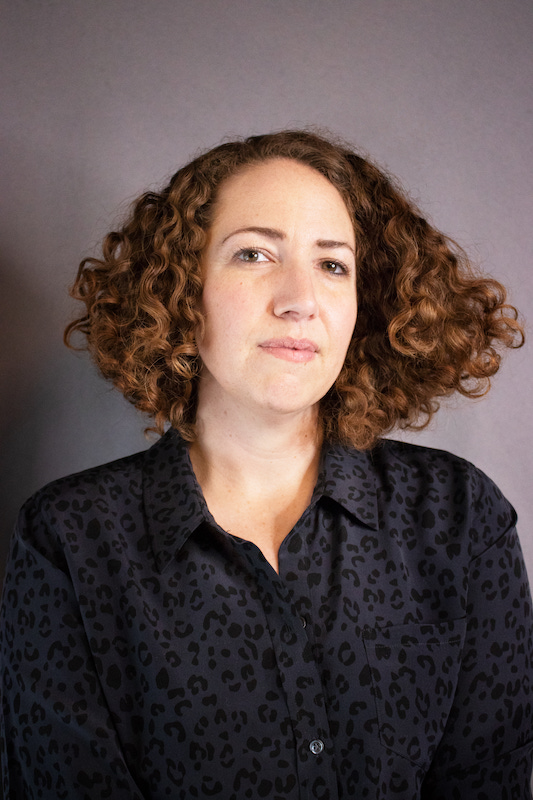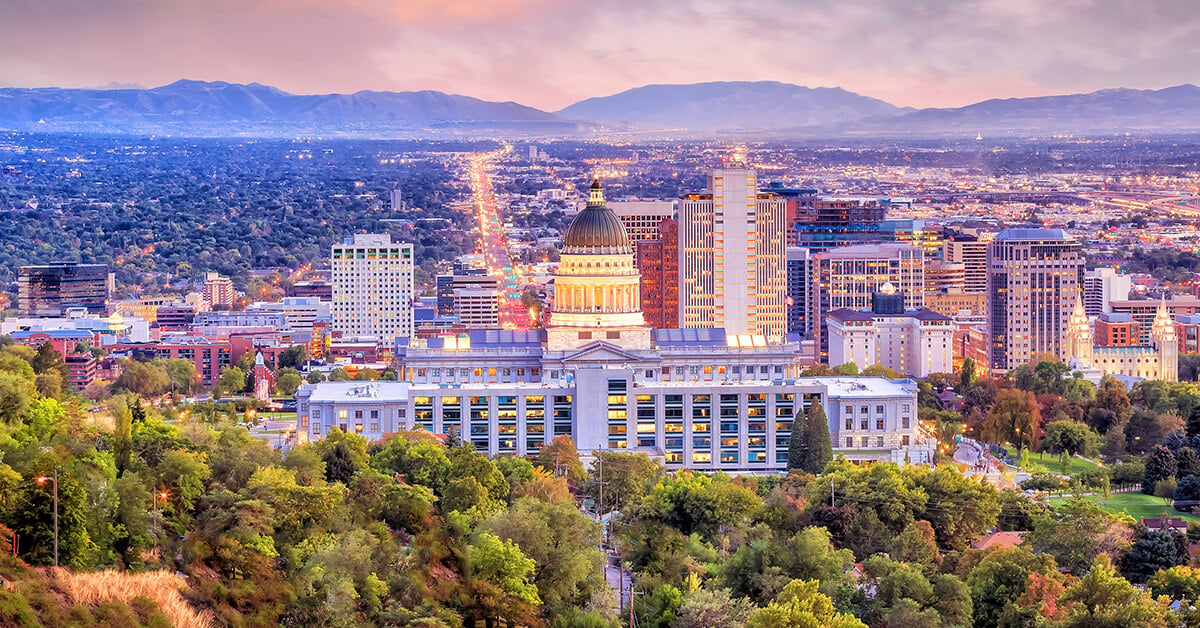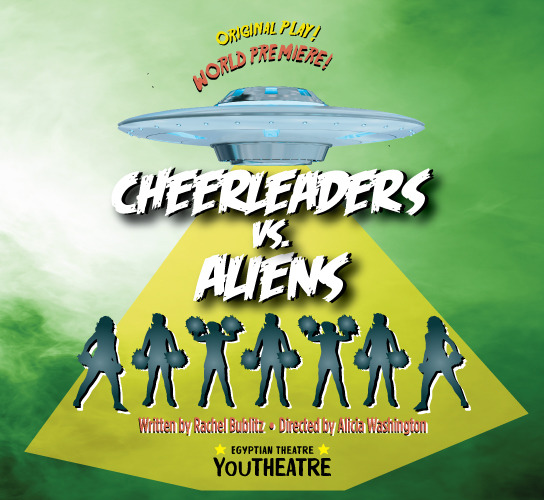Though I’d known Rachel online, we first met in person in my hometown of Buffalo, NY, when came for the world premiere of her play, BURST at Alleyway Theatre. We spent a fun day in Niagara Falls on the Maid of the Mist and her show was nothing short of spectacular. I knew she was successful, but a recent spate of activity prompted me to revive my #PLONY (Playwriting Living Outside New York) series to include her. Like all #PLONY I’ve profiled, her path to success is atypical, which again proves that #PLONY are a different breed who forge their own way.
What is your geographical history?
I grew up in San Diego, for college moved to the Bay Area to go to San Francisco State, then moved around the Bay area for ten years. In 2016, we moved to Salt Lake City. We need space. Our apartment was two bedrooms and 800 square feet with two kids. The mortgage here was cheaper than rent.
But also, the first time I did the Kennedy Conference Regional Festival, my husband said, “If you’re going to be doing more travel, we need backup.” That promoted the move; my husband’s family is from here, so we had access to free babysitting.
What did you go to school for?
I finished a bachelor’s in performance pregnant with my first kid—my son was born in 2010—and living in the Bay Area, it was impossible to get a sitter and be in a play and make any money. I started thinking what else I could do that wouldn’t take me away as much and thought I may as well try to write a play. That was in 2012. After writing a year or two, I went back to get an MFA in playwriting and a regular in creative writing, both from San Francisco; you can do both at the same time and I wanted to have teaching as a fallback.
And what about acting?
I don’t have time. The kids are old enough that they don’t need a sitter, but they’re in a lot of sports and only in high school for so long.
So what happened with those early plays?
I had a small production of the first play I ever wrote, The Fantasy Club, and it was fun. I met the AD through a playwriting group. Audiences laughed, and we sold tickets, but I don’t know if I’d ever want to read it or show anybody now. I did pop-up theater and worked with the San Francisco Olympian Festival and that was fun.
Other successes came after the degrees. I learned a ton and grew a lot, but I don’t think I gained any footholds professinally because of my degrees. I joined the Playground at Berkeley Rep in grad school; it’s a playwright incubator where you get a prompt and have four days to write a ten-minute plays to perform on the Berkeley Rep stage. I’ve been Best of Playground and that helped get my name out.
It also gave me six to ten new ten-minute plays a year, so when I had something that thematically fit, I would send them out and had a lot of ten-minute plays done.
What do you consider the real turn?
My first big production was at Z space. They were looking for problematic plays, and RIPPED had been rejected around country for being too much a hot topic and controversial. In 2019, they picked it for festival, and the production was beautiful.
RIPPED at Z Space
When was the first moment you really felt like a playwright?
Early on when I wrote my first full-length play, I’d bring ten pages to meetings, and I got people laughing. There were a lot of things that came naturally for me in writing, making sure exposition didn’t sound like exposition, making things funny. I can’t help but write funny things—sometimes I don’t even mean to—but being in a room with people all trying to do this and making them laugh—there’s something here. It was so fulfilling being back in theater after being a stay-at-home mom. It’s nice to be able to do both things.
What’s been the most exciting moment of your career?
The Rolling World Premiere. I’d seen so many rolls come through and it felt like this big important thing to reach for. I’ve been trying to do it forever. I tried with RIPPED and had two but couldn’t get a third. With BURST at Alleyway, we were too close to make it work. But this third time was the charm. With FUNNY LIKE AN ABORTION, Raymond Bobgan at Cleveland approached me and worked his magic. 
FUNNY LIKE AN ABORTION at Mile Square Theatre
How did you get NNPN theaters to look at your work (that’s always a big question from playwrights)?
In Playground’s festival, they do readings of full-length plays, and BURST was done as a reading during the pandemic. I asked the AD if he had a play he was submitting and if not, would he submit mine. He said yes.
I used to submit more significantly than I do now, and I sent Raymond and early draft of RIPPED. He said it wasn’t right for his season but he wanted to know what was happening with me and this play. Every time I wrote, same answer: “I really like you as a playwright but this doesn’t fit right now. Keep me in the loop.” That happened with FUNNY LIKE AN ABORTION in 2019—“keep me in the loop”—but I didn’t need to. He found newer drafts on NPX, and when a spot opened up, he chose it.
An AD emailing you back is so huge even if the answer is “not right now.” They know your name and enjoyed your play. It’s not as big a production but it builds road for the future.
What was your biggest playwright disappointment?
The pandemic was a real bummer. I had a reading at Pasadena Playhouse, meetings set up in New York with agents, all sorts of interest after RIPPED with future productions. A production scheduled for summer 2020 got canceled, but they thankfully kept the play and did it last year, so that was one thing that still happened. I won the Glickman Award for best new production in the Bay Area during the pandemic and I didn’t get a trophy because the conference didn’t happen. I was talking to an AD in the Bay Area, and he was like, “Weird. I didn’t know that. Usually I always know.”
Do you feel like you’ve been able to regain momentum?
I would say I have not gotten it back. And I’m different than I was prepandemic. I used to submit hundreds of plays a year and reach out and stay involved. I’m also not writing as much as I did but have given myself space and permission to come back at my own pace.
I have published work for high schools and theaters and I’ve noticed if a high school does a play, a year or two later, another high school will do it. It builds momentum without me doing as much. I know there is a ton I could do, like giveaways for high school and college theaters. I used to have an email list that I send out updates once a month, sign up and get a copy of the script. They’re all good ideas that just take time.
What have you been writing?
I wrote a play that was a commission last year and it went sideways, and I backed out. I’m in the early stages of another commission now. It’s the first thing since the pandemic that I’m super invested in, and I’m doing a lot of research. University of Utah has a teacher who wants to do workshops of it and produce it.
Do you feel like you have been more successful in Utah or the Bay Area?
Probably the Bay Area. In Utah, I’ve never had a production of something strictly for an older audience, though I’ve had readings. And I had a lot of relationships with smaller theaters always willing to take a call or email. For my youth plays, though, definitely here. I have one teacher who’s an actor and always produces my stuff in his middle school. And I’m an artist in residence at Egyptian Youth Theater and commissioned regularly for middle and high school; they produce a play of mine about every year after a commission.

From your geographical location, what is the best way to get your work into the hands of those who will produce it?
Again, publications and knocking on doors. You have to be published before they consider you. My back door was my first full-length play, CHEERLEADERS VS. ALIENS, a commission from Egyptian; a lot more publishers will look at play written for high schools because they need flexible casting or a lot of female parts. Once I was published by one, other publishers would start looking at me. And I’m just trying to get a play with all the publishers, so I have a relationship and understand how it works from the inside. It’s a matter of marketing to reach the most people possible.
You don’t have an agent and that seems to be just fine.
I’ve talked to playwrights who told me I’m crazy and I need to try to get an agent, but I haven’t had the enthusiasm. Before pandemic, that seemed like the obvious next step, but I do think it feels like my efforts are best put in other places at the moment. It doesn’t feel like it should be a priority at this time. I’ve gotten so good at reading contracts and what to look for and I push for more percentages. I push back in ways I never would have if I had an agent. I learned a lot repping myself and having to be my own advocate.
What limitations do you find in being a #PLONY? Benefits?
I don’t feel limited. I find a lot of joy in getting colleges and high schools to do my work. In high school, we had so many gender-swapped roles, so many plays that were funny twenty years ago and now are not. There’s a lot of things I wish I could have done in high school and college, and those roles weren’t available, so when I start a new play now, I think about what I would have loved to do.
I would have loved to do BURST in college; I would have fought people in the audition to get a role in that play and it feels really satisfying. I get a lot of emails from students just so excited to do work that’s not available. I love getting people excited about theater and making them feel there is a place and roles for them. It’s so rewarding.
I also love seeing parts of the country I hadn’t seen before. It’s such a blast! I’m from California and now I live in UT and have had such a small view of the country, travel is opening my eyes to how different it is! So many people don’t have mountains; it’s amazing! That’s been super exciting.
Have people advised you to move to New York? Do you feel like your career would have been different there?
It’s subtext a lot, I feel like, but nobody’s ever said I have to. New York is one of my favorite places to visit. But I’d have a different career anywhere. My career would be different if I lived in Chicago or San Diego. I’d probably have more productions in New York, but that would be because I’d have more connections and coffee dates and meet more artists. That’s not better or worse. It’s just there.
Are you earning a living as a playwright?
I am slightly contributing my household, but if my family had to live off my income alone, it would look very different. I’d have to work full time as a professor as well, and we wouldn’t be able to do fancy water polo camps and travel as much as we do.
What’s coming up for you?
After the Rolling World Premiere, there are already two other productions outside the roll.
Now that you landed the Rolling World Premiere, what’s the next goal?
I don’t know if I’ve realized what the next one is. It might be a production at a bigger theater because I’ve mostly done pretty small theaters. I’ll have to think about that.
What are your thoughts on NPX?
I’ve gotten a ton of productions through NPX, especially for ten-minute plays, but also for full-lengths. Putting your play on there, using as many phrases as you can so it pops up in searches, and being a part of the community, reading plays, writing recommendations. Putting good energy into the world has got to be good, maybe not directly to your career, but maybe it is. I’ve made a lot of friends through recommending, so when we are in festivals, it’s amazing to get a coffee and face to face. It’s so cool. I don’t know anything else that presents like that. These are people I never would have heard of if not for NPX.
What proactive steps do you feel like PLONY can take to further their careers?
Stay positive and find the silver lining in things that might not on the outside look positive. Meeting people in both email and in person; that’s helped me a lot. When I moved to Salt Lake, I had a bunch of coffee dates with directors and artistic directors and playwrights and that’s how I got the lay of the land. The Egyptian never did commissions before, and I asked if they’d commission CHEERLEADERS VS. ALIENS. She said, “I don’t know that how that works but yeah.” Ask nicely. Find positives in anything. I wrote six more plays this year; I don’t have any productions, but I have six plays. Half of your job as a playwright if being a cheerleader for yourself and your work and that can be hard. It’s super important in continuing a career that has more rejection than acceptance.
(Click on the home page to read about my plays!)
–Please follow me on X @donnahoke or like me on Facebook at Donna Hoke, Playwright.
–Read my plays and recommendations on the New Play Exchange!
–Playwrights, remember to explore the Real Inspiration For Playwrights Project, a 52-post series of wonderful advice from Literary Managers and Artistic Directors on getting your plays produced. Click RIPP at the upper right.
–To read #PLONY (Playwrights Living Outside New York) interviews, click here or #PLONY in the category listing at upper right.
–To read the #365gratefulplaywright series, click here or the category listing at upper right.
–For more #AHAinTheater posts, click here or the category listing at upper right.
Leave a Reply